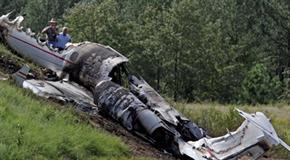Features
Tires Blamed For Barker / DJ AM Jet Crash
It turns out all four of the private jet’s tires exploded while the jet was barreling down a South Carolina runway at 150 mph. According to investigators, pieces of the tires struck the jet, damaging the craft’s hydraulic system, resulting in the plane’s breaks failing.
But that was only the beginning of the disaster. Also damaged was the jet’s thrust reversers. Often used to reduce speed, the thrust reversers actually did the opposite and caused the jet to increase velocity at the same time the pilot, who had only 35 hours experience flying Learjets, attempted to slow the craft’s speed.
You already know the result. The jet careened off the runway, crossed a five-lane highway, hit an embankment and burst into flames, killing everyone on board except Barker and DJ AM, who were hospitalized for severe burns. DJ AM, whose real name was Adam Goldstein, died 11 months later of an accidental drug overdose.
Investigators told the NTSB that under-inflated tires might be a widespread problem in the air charter biz and that some companies may not be aware of how rapidly tires on a business jet can lose pressure, and that the last time the tires were checked on the Learjet carrying Barker and DJ AM was three weeks before the crash. Investigators also said the type of tires used on the jet lost about 2 percent of pressure a day and would have to be replaced after eight days.

As you can probably imagine, the crash resulted in settlements and lawsuits. Barker, along with the families of his personal assistant, Chris Baker, and bodyguard, Charles Monroe Still Jr., reached settlements with several companies, including the jet’s owner, Global Exec, ITAS Inc., Learjet Inc., and Goodyear Tire & Rubber Co. The family of DJ AM also reached settlements with the companies involved. So far, terms of all settlements resulting from the crash have been declared confidential.
Meanwhile, Global Exec and ITAS are suing the plane’s manufacturers, Learjet and Bombardier.